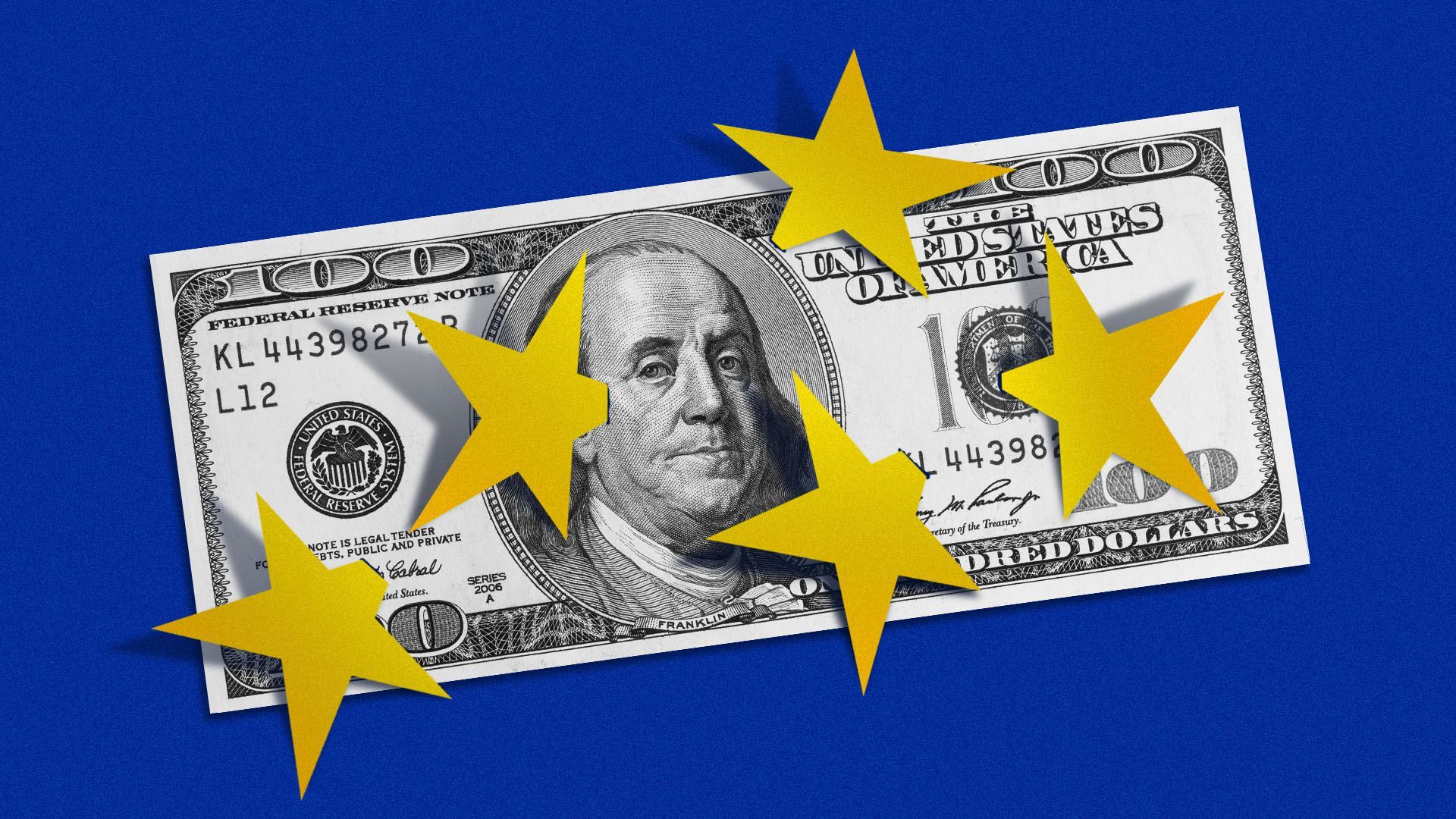| | | | | | | | | | | Axios Markets | | By Matt Phillips and Emily Peck · Jul 21, 2022 | | 🍉 Morning. Matt here. And maybe I'm imagining it, but amid a dearth of earth-shattering earnings, the market is radiating lazy, hazy summertime vibes. The S&P 500, up for four of the last five sessions, is enjoying its best month of the year, climbing 4.6% so far in July. The situation is far more sinister across the pond, however, as you'll see below. Today's newsletter, edited by Kate Marino, is 1,061 words, 4 minutes. | | | | | | 1 big thing: Europe's heat wave magnifies energy woes |  | | | Illustration: Sarah Grillo/Axios | | | | Europeans didn't need another reminder that they're living through an energy crisis — but, boy, did they get one, Axios' Kate Marino writes. - The historic heat wave pummeling the continent this week sent power prices to new record highs; in France and Italy, average weekly prices have more than tripled over the last five weeks, according to Rystad Energy.
Why it matters: The strains on Europe's ability to power its economy will not only hurt its growth but could also drag on economic partners like the U.S. The big picture: Russian natural gas flows to Europe have already fallen to below one-third of their level a year ago, according to Eurasia Group. - German chemicals giant BASF among others has warned that it has "no short-term solution" for replacing Russian gas as a power source if it gets entirely cut off.
The International Monetary Fund now projects that the worst-case scenario — a complete cutoff of Russian gas — could shave more than 2% off the EU's gross domestic product. - Some countries would be worse off than others: Hungary, the Slovak Republic and the Czech Republic could see GDP impacts of up to 6%, the IMF estimates (see the chart below).
A total cutoff hasn't happened — yet. But analysts at Goldman Sachs already forecast heightened odds of an EU economic downturn, including a full-on recession in Germany, due to the deteriorating outlook for Russian gas supply. - "A sustained decline in these vital energy inputs would significantly weigh on European manufacturing production, particularly for energy-intensive industries like chemicals, machinery, and food and beverages," Goldman wrote in a recent research note.
- "The spike in home heating costs will weigh on European consumption, as higher inflation crowds out consumer purchases of non-energy goods and services," the analysts wrote.
Go deeper: Goldman sees a risk of a substantial spillover into the stateside economy since 28% of U.S. exports find their way to Europe — representing 3% of U.S. GDP. What to watch: Russia today resumed sending natural gas at a reduced volume via the key Nord Stream pipeline to Europe after a weekslong shutdown for maintenance — but that could prove fleeting, the WSJ reported. Bracing for the worst, the European Commission yesterday took the extraordinary step of asking member countries to voluntarily reduce their gas consumption by 15%. The bottom line: Europe's heavy reliance on external energy supplies, and the lack of alternatives — problems that have been flagged for years — are about to come home to roost in a big way. - And the growing possibility of a real energy crunch later this year may be felt way beyond its borders.
|     | | | | | | 2. Charted: Europe's economic vulnerability |  Data: IMF analysis; Chart: Simran Parwani/Axios Europe can't avoid economic harm if Russia cuts off natural gas supplies — but policymakers have tools to reduce the damage, the IMF said, Axios Generate's Ben Geman writes. The intrigue: As mentioned above, the IMF analysts estimated the GDP effects of Russia going beyond the partial reduction to date and instead implementing an "unprecedented total shutoff." They modeled this risk under two scenarios: - An "integrated" market approach within the EU and globally, where more LNG is available and gas supplies move freely among EU countries.
- A "fragmented" approach with far less access to alternative supplies, marked by shortages and higher prices.
The bottom line: A gas cutoff would test European unity. Members could mitigate the impact by expanding agreements to share gas across countries, easing infrastructure bottlenecks and encouraging energy savings, the IMF says. Read the analysis. |     | | | | | | 3. Catch up quick | | 🇨🇳 China's bond market sell-off engulfs more borrowers recently deemed healthy. (Bloomberg) 🏦 Congress' push to regulate Big Tech is fizzling out. (Axios) ⬆️ Executive pay climbs with companies on the hook for the tax bill. (WSJ) |     | | | | | | A message from Axios | | Axios Smart Brevity book | | |  | | | | Learn how to communicate more effectively with Axios' new book, Smart Brevity: The power of saying more with less. Axios' co-founders share their secret sauce on the power of saying more with less to get people to pay attention to what matters more to you. Pre-order today and get an exclusive Smart Brevity video. | | | | | | 4. Where it's cheaper to rent than buy |  Data: Realtor.com; Chart: Axios Visuals Rents have soared over the past year — but renting is still more affordable than buying at the entry-level in three-quarters of the country, Emily writes, from a new analysis released today by Realtor.com. - This is a big shift from January when renting had the edge in a little over half of the markets.
- The difference now is higher mortgage rates, which make the median payment on a "starter" home more costly than on a comparable rental apartment, according to its analysis. Home prices have not yet started to fall, which could've balanced out the equation.
Why it matters: Whether to rent or to own is a timeless conundrum, filled with intangible caveats. Some people want to put down roots for the long haul. Others don't want to deal with the hassle (or expense) of maintaining a house or apartment. - In a housing boom, when home prices are rising, renting is typically a better bet. But in the pandemic era, with more people looking for more space all at once, both options got more expensive.
- Rent increases do seem to be slowing down. Average rents grew for the fifth consecutive month, up 14.1% from last year — that's down from a peak in January of 19%, per Realtor.com.
State of play: The analysis shows that some of the most expensive markets for homes are where it's most economical to rent. - In Austin, it costs 97.8% more to buy a starter home than to rent — a difference of $1,822. In San Francisco, it's 80% more.
- The analysis considered asking rents in June for studio, 1- and 2-bedroom apartments listed on Realtor.com and at large apartment complexes, compared to a monthly payment for a starter home (up to only two bedrooms) based on June mortgage rates and list prices.
|     | | |  | | | | If you like this newsletter, your friends may, too! Refer your friends and get free Axios swag when they sign up. | | | | | | | | 5. 📈 CD yields show signs of life after COVID |  Data: FactSet, Bankrate; Chart: Axios Visuals Financial institutions are actually starting to pay you a little bit when you hand over your cash, Matt writes. Driving the news: Rates on one-year certificates of deposit — which are closely tied to the short-term interest rates determined by the Federal Reserve — have surged this year from near-zero levels. - Now, they're roughly back where they were before the COVID crisis.
Yes, but: You're not going to make a ton here. Rates on one-year CDs are still short of 1%. - In real terms — that is, adjusted for inflation — the purchasing power of your savings would decline by roughly 8% over the next year if the last year's rate of inflation continues.
The bottom line: Still, if you've got a bit of cash in your pocket, it's now worth looking around for of a CD — especially if you want to steer clear of stocks a while longer. |     | | | | | | A message from Axios | | Axios Smart Brevity book | | |  | | | | Learn how to communicate more effectively with Axios' new book, Smart Brevity: The power of saying more with less. Axios' co-founders share their secret sauce on the power of saying more with less to get people to pay attention to what matters more to you. Pre-order today and get an exclusive Smart Brevity video. | | | | 🍄 1 thing Matt is watching: Listen, you never would have caught me at a Grateful Dead concert or anything, but I'm surprisingly fascinated by the Netflix series, "How to Change Your Mind." Produced by Alex Gibney and best-selling ecology writer Michael Pollan, it examines the history, science, spirituality and medical potential of psychedelics and mind-altering substances. I can't help but be a bit skeptical of some of the claims, but it's worth looking at. |  | | Why stop here? Let's go Pro. | | | | | | Axios thanks our partners for supporting our newsletters. If you're interested in advertising, learn more here.
Sponsorship has no influence on editorial content. Axios, 3100 Clarendon Blvd, Arlington VA 22201 | | | You received this email because you signed up for newsletters from Axios.
Change your preferences or unsubscribe here. | | | Was this email forwarded to you?
Sign up now to get Axios in your inbox. | | | | Follow Axios on social media:    | | | | | |
Post a Comment
0Comments